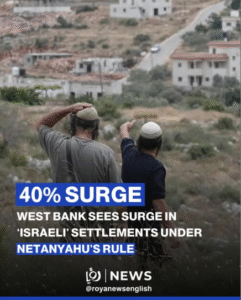The West Bank has seen a dramatic 40% increase in Israeli settlement activity under Prime Minister Benjamin Netanyahu’s latest term, drawing international criticism and fueling tensions in the already volatile region. According to recent reports, this surge includes approvals for thousands of new housing units in both existing settlements and outposts deemed illegal under international law.
Critics argue that this expansion undermines any possibility of a two-state solution, further marginalizing Palestinian communities and escalating conflict on the ground. The Israeli government, however, defends the move as a matter of national interest and security, with some officials openly supporting full annexation of parts of the West Bank.
The growth of settlements has sparked protests from Palestinians, human rights groups, and foreign governments, particularly the European Union and the United States, who view the expansion as a violation of international agreements and an obstacle to peace.
Meanwhile, Palestinians living near expanding settlements face increased displacement, restricted access to land, and rising violence from settler groups. The United Nations and other watchdogs have reported an uptick in settler attacks and demolitions of Palestinian homes and infrastructure.
As Netanyahu’s government pushes ahead with settlement policies, hopes for renewed peace talks appear increasingly distant. Many warn that the expanding settlement footprint is entrenching a one-state reality, making the vision of an independent Palestinian state ever more elusive.


